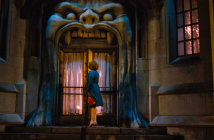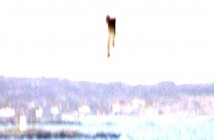The Japanese Dog (2013)
Cast: Victor Rebengiuc, Serban Pavlu, Ioana Abur
Director: Tudor Cristian Jurgiu
Country: Romania
Genre: Drama
Editor’s Notes: The following review is part of our coverage for the Film Society of Lincoln Center’s Making Waves Romanian Film Festival, which runs from December 4 to December 8. For more information visit FilmLinc.com and follow FilmLinc on Twitter at @FilmLinc.
In the summer of 2010 a great flood devastated Romania’s north-east. At least twenty-one people died and many were displaced from their homes. Tudor Cristian Jurgiu sets his debut feature The Japanese Dog in the aftermath of the floods.
Costache (Victor Rebengiuc) is an elderly gentleman who lost his wife and his home in the devastation. He goes about his daily errands and tasks while trying to make a new home in the house he’s been given. Throughout his day, he interacts with few friends, most of them informing him that Tico (Serban Pavlu), his estranged son is coming to visit him. Costache shrugs and dismisses this, not believing the rumors. He does eventually show up with his Japanese wife (Kana Hashimoto) and son (Toma Hashimoto) in tow. The film observes the intricacies and the complexities of family through the strained relationships of father and son and the connections made between grandfather and grandson.
The stilted relationship between Tico and Costache is acutely felt…This is beautifully created by the same meditative lens, standing at attention, letting the viewer take in the view and the sound of the actor’s silence.
The film is a slow paced work, a signature cinema vérité style in Romanian film. Life moves slowly in rural towns and thus the camera follows suit. Lingering long shots of the Romanian landscape at various stages of the day express a warm familiarity of country and a traditional way of life. While most of it is filmed outside, moments inside homes are naturally lit and can be dark at times, but it’s how life is by candle light or little to no electricity. Homes are cluttered and dusty and thus the films settings are as well.
 Rebengiuc plays Costache as a stoic old man who’s exasperated with everything and everyone he has to deal with, but does it anyway. As the town bombards him with news of Tico’s visit, he quickly gets angry, letting his discomfort show in his face and mannerisms. Even as his son arrives, the looks Revengiuc gives him are distant and cynical. It’s a treat to see him light up as he warms up to his grandson despite their cultural differences. The stilted relationship between Tico and Costache is acutely felt and Costache’s grief is palpable. This is beautifully created by the same meditative lens, standing at attention, letting the viewer take in the view and the sound of the actor’s silence. They’re gorgeous shots that make up for most of the film’s quiet tortoise-like speed. One particular scene takes place in a the lush greenery that surrounds Costache’s home. Costache and his grandson are outside trying to get to know each other when the boy shows his grandfather a robotic toy dog. The sun shines bright, revealing Costache’s fascination with the boy and his wonder at the exposure of this very high tech toy. It’s a tender moment made more so by the setting and a still lens.
Rebengiuc plays Costache as a stoic old man who’s exasperated with everything and everyone he has to deal with, but does it anyway. As the town bombards him with news of Tico’s visit, he quickly gets angry, letting his discomfort show in his face and mannerisms. Even as his son arrives, the looks Revengiuc gives him are distant and cynical. It’s a treat to see him light up as he warms up to his grandson despite their cultural differences. The stilted relationship between Tico and Costache is acutely felt and Costache’s grief is palpable. This is beautifully created by the same meditative lens, standing at attention, letting the viewer take in the view and the sound of the actor’s silence. They’re gorgeous shots that make up for most of the film’s quiet tortoise-like speed. One particular scene takes place in a the lush greenery that surrounds Costache’s home. Costache and his grandson are outside trying to get to know each other when the boy shows his grandfather a robotic toy dog. The sun shines bright, revealing Costache’s fascination with the boy and his wonder at the exposure of this very high tech toy. It’s a tender moment made more so by the setting and a still lens.
You wouldn’t know this was Jurgiu’s first feature considering he’s worked only in short film before The Japanese Dog. However, in some ways, the power of this film is in its attention to the continual mediocrity of life even in the face of drastic change and struggle.
While the film moves at a syrupy pace, it eventually shapes into a charming tale of relatable familial struggles and possible reconnections in redemption.
While the film moves at a syrupy pace, it eventually shapes into a charming tale of relatable familial struggles and possible reconnections in redemption.



